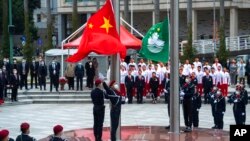In a move that mirrors its national security clampdown in Hong Kong, Beijing is inserting itself more directly into the security affairs of Macao in spite of long-standing assurances the former Portuguese colony would enjoy a high degree of autonomy.
A December 3 report published by the official Xinhua news service said the director of the liaison office in the city, a mainland official appointed by Beijing, will also serve as an adviser to the Committee for Safeguarding National Security of the Macao Special Administrative Region. .
Fu Ziying, the current liaison office director, will be “in charge of supervising, guiding, coordinating and supporting the Macao SAR in safeguarding national security,” the notice said using the abbreviation for “special administrative region.”
The committee will also have three new national security technical advisers, the report said.
Macao Chief Executive Ho Iat-seng, the head of its government, according to Xinhua, proposed such appointments, as the city is on track to revise its national security law for the first time since its implementation in 2009.
The city’s national security law criminalizes treason, secession, sedition, subversion, theft of state secrets, foreign political bodies’ activities in the city, and their establishment of ties with local bodies. Offenders are subject to up to 25 years’ imprisonment.
Macao has long been seen as a tamer city by Beijing than neighboring Hong Kong, with only three pro-democracy candidates out of the 33 members of the Legislative Assembly. Both cities operate under the “one country, two systems” framework in which they have been promised a “high level of autonomy.”
“The major civil power in Macao comes from the pro-Beijing camp, so there was not much opposition to the passing of the national security law,” said Ng Kuok Cheong, a leading opposition figure in Macao who was disqualified from participating in September’s elections to the Assembly.
The government cited “new situations and challenges in its safeguarding of national security” as the reason for the intended change in a statement.
This aligns with Ho’s 2022 policy address that promises to “consolidate the foundation for ‘patriots governing Macao’” and “enhance relevant laws and institutional safeguards in support of this principle.”
This follows the first “patriots only” legislative election in September that saw the government disqualify three dozen pro-democracy candidates two months prior to the vote, on the grounds of not upholding the Basic Law or not pledging allegiance to Macao.
The election witnessed a record-low turnout rate since Macao’s 1999 handover to China, and a record high rate of blank votes. Macao is a former Portuguese colony. The handover occurred two years after Britain returned control of Hong Kong to China.
“Allowing only ‘patriots’ to run in the election is the central government’s way to control Macao’s public power through political categorization,” Ng said, referring to the government in Beijing.
Macao’s secretary for security, Wong Sio Chak, pointed to Hong Kong’s 2020 national security law as an important reference point for Macao. The Hong Kong law was a response to the largest pro-democracy movement in that city’s history. More than 100 people, including opposition politicians and students, have been arrested under that law.
The Macao law has a broader range of offenses than does the Hong Kong law, which was drafted after the 2019 movement.
Macao’s government considered the new law in Hong Kong a success, citing a speech by the liaison office chief in Hong Kong, Xia Baolong, that the measure “had produced great effect in Hong Kong, having had profound significance and leading the city back to a ‘stable’ status after ‘chaotic disorder.'”
The proposed amendments to Macao’s national security law will likely include further restrictions to online activities as “the experience in Hong Kong has shown that acts committed online without violence can jeopardize national security,” a the local Macao News quoted Wong as saying.
Macao might see fewer arrests than Hong Kong under the national security law, according to political commentator Sonny Lo.
“If Macao’s political threat to the center [Beijing] is much less than Hong Kong’s, there might not be arrest in Macao, unless someone violates the national security law,” Lo told VOA by email. “The civil society in Macao is quieter as most people here were born in the mainland and many are immigrants – a proportion larger than that in Hong Kong.”
Lo also said that the appointment of committee members is “important” and a way to “protect the economic national security” of China.
Separately, China is exerting its influence over the casino business in Macao, the world’s largest gambling hub, described as “the Las Vegas" of China. Casino gambling is illegal in mainland China.
Beijing, he said, “perceives the mainlanders’ gambling as siphoning mainland financial coffers, especially if they were cadres and officials.
"The law will safeguard the centre’s national security interests, including political, economic and developmental interests,” Lo said.
A few days after Beijing’s announcement on appointing advisers, Macao arrested the city’s leading casino junket operator, Alvin Chau, after Chinese President Xi Jinping said illegal cross-border gambling undermines the country’s economic security, social security and national image.
This is part of Beijing’s reasoning behind strengthening the national security law, as China’s state-owned Global Times cited senior Hong Kong and Macao affairs adviser Chen Duanhong saying that the external forces involved in Macao’s gambling industry are “complex.”
Politically, Ng also expected mass arrests similar to those in Hong Kong to happen in Macao only in the case of “extreme deterioration of the political situation.”














